Music School Mythbusters: Is Playing Politics Necessary?
The Myth
In practically every profession, there are those who utilize personal connections to their advantage, and the classical music world is sadly no exception. Every pre-professional student has heard bizarre tales of rigged auditions and crass politics, and such occurrences do not seem to be confined to professional orchestral auditions. How many times have you heard a colleague remark that they weren’t accepted at a summer festival because “the teacher who judged the recordings has a grudge against my teacher,” “they don’t take anybody from our school,” or “my friend got in, but his teacher was on the committee”? If you’ve been in residence at any music school for longer than a year, chances are you’ve been on the receiving end of such comments more than once. But is this blatant disregard for professional conduct really as widespread as it seems? Or do we tend to assume its influence in our own audition outcomes merely because of a few, exaggerated student experiences? In this first edition of Music School Mythbusters, we’re going to find out.
The Argument for the Myth
You would have to be a blissfully oblivious pragmatist to believe that every young musician admitted to an orchestra, summer festival, or music school is selected purely because of their outstanding ability. The adjudicating musicians are humans, too, and therefore just as flawed and susceptible to selfishness as the rest of us. The politics that ensue can range from a genuinely amiable gesture (“Oh, that’s my old friend from IU, we can forgive those missed octaves….”) to a shockingly vituperative line of reasoning (“Oh, look, he studied with Hotshot Teacher A. I applied for his studio twenty years ago and got rejected. Well, look who’s laughing now! Muhahaha!”). While I’m fairly confident that no Dracula-worthy cackles are typically emitted on the committee’s side of the audition screen, I wouldn’t be surprised if they do occasionally echo within a couple judges’ heads. There’s simply no denying it–politics and cheating can and will happen in any audition situation, and with the advent of the information age, the details of such occurrences have spread from behind the audition screen to behind the computer screen. A quick Google search for “Rigged Orchestra Audition” yields a variety of these stories, often posted in response to the queries of an anxious young musician.
“Some people try to manipulate whatever system is put in place,” writes one such respondent on a Yahoo forum. “For a while, it seemed that any violinist who wanted to get into our orchestra had to buy a lesson or a couple of lessons from a particular violinist. She has the reputation of being a very good teacher, and I think people benefited from her teaching; but since she was married to our concertmaster at the time, she would tell her husband who *could* get into the orchestra.”
“I have heard of instances of audition candidates calling the cell phone of a particular committee person, who would then get his/her messages, would know what number candidate they were, and would try to sway the committee for that person/those people,” this same individual continues.
“But,” he adds, “this is why we have a committee of 10.”
Several forums include an indignant musician writing in to describe his unsacrimonious treatment at an audition, eliciting an outpouring of sympathy from online colleagues. Indeed, one bass player’s tale of an obviously political experience in Finland led one respondent to post a quote from New York Philharmonic Music Director Alan Gilbert on the issue:
“I learned some lessons in Stockholm where, over the years, we had problems with the audition process. When I was Chief Conductor there was a bizarre attitude about auditions: of course the stated policy was that auditions had to be taken, but, in practice, quite a few musicians were granted positions – and ultimately given tenure – who had never played an audition. The argument internally was, ‘They are the right person, we need to find the right person no matter what, and that’s more important than process.’ That was refreshing in a way, because in Sweden it very often can seem as though process is more important than result, but there was a palpable negative effect: people lost faith in the way we ran auditions….In fact, we knew of people who were interested in open positions who decided not even to try since they hoped to get into the orchestra through the back door, as it were.”
A poster on cellofun.yuku.com paints an equally disparaging picture of the situation:
“I do remember one audition for a regional orchestra where we all played behind a screen, they picked some of us (including me), and then, when they found out who we were, [they] called back one of the people who had been sent home — the one they had wanted, who as I recall ultimately got the job. If it happened on that level, it probably happens elsewhere.”
These are just a few examples of the myriad stories that trickle down the gossip stream and flood the halls of the conservatory. With little doubt remaining as to the reality of musical politics, the inescapable question arises: is it disadvantageous to play by the rules?
The Argument Against the Myth
But as irrefutable as such “conspiracy theories” might seem, there’s a similarly significant body of evidence to suggest that this apparent epidemic of politics is in fact a mere exaggeration of a few anomalies. The first hit that shows up on Google following the “Rigged Orchestra Audition” search is actually a well-written blog dating from the summer of 2011 entitled, “That Audition was Rigged! What a Joke!” In the piece, hornist Bruce Hembd addresses the issue head on, writing that “for people of a certain mindset the world is corrupt, rife with conspiracies and hidden agendas. A common thread that comes up now and then among auditioning musicians is that ‘auditions are rigged.’ The notion behind this theory is that the outcome of the audition was somehow predetermined. It can be a tempting piece of gossip to buy into, especially in circumstances where a local musician or regular substitute wins the job, or when no candidate is chosen as a winner.”
Obviously, Hembd disagrees with such theories, ultimately concluding that “reality is usually far more complicated than a simple conspiracy theory or a dismissive statement,” and citing a variety of other factors–such as an imbalance of power between a conductor and musicians, and unharmonious interpersonal relationships amongst adjudicators–as potential causes for suspicious audition results (i.e. no winner named).
A great example of a player bemoaning the unfairness of the process, before being subsequently rebuked, plays out in a forum on the popular website, orchestraplayers.com. User “qiaoflute” starts up the debate with this post:
“Recently there was a flute audition in some orchestra in a northern country. I did not go, because I knew what the result was going to be and it was what I had thought[–]the job went to the person who was already freelancing with [the orchestra] for some years. That was not the first time, and will not [be] the last time either. Since most auditions are political, what is [the] point of auditions?”
However, an obviously wise colleague dispenses some pearls of wisdom in the following response:
“We hear the word ‘politics’ or hear about an audition being ‘rigged’ to a familiar player’s advantage. However, those players who have been subbing generally blend right away, they play with great style and sound concept because they’ve been subbing for a while with the orchestra. Be the best player at the audition, and there will be fewer politics involved.”
Perhaps the most definitive statement on the subject is found at the conclusion of a post on funbrass.com, which outlines a typical audition process:
“Once the audition is over, it’s no use making up conspiracy theories about how unfair the jury is or the audition being “rigged”, etc. That’s a loser attitude. Learn from the experience and tweak your playing for the next one.”
All online content aside, I can recall some personal experiences in which I heard that an audition was a lost cause, but the hearsay in question turned out to be inaccurate. Once during my undergraduate studies, I was auditioning for a competitive summer festival. A couple days before, I mentioned the upcoming audition to an acquaintance at my work-study job.
“I don’t want to dash your hopes,” she told me. “But nobody auditioning in Boston has gotten into that festival for the last three years. In fact, one of my friends wants to get in so badly that she’s auditioning in New York!”
I wasn’t sure what to make of this information, but tried to push it to the back of my mind as I stepped into the audition room a few days later. Ultimately, I received a rejection, but it turned out that a couple of my colleagues taking the same audition had actually been accepted. Unless they had somehow learned to apparate to New York, I was forced to conclude that people from Boston were, in fact, being seriously considered for the festival in question.
A further confirmation of this myth’s invalidity lies in the fact that so many of these “audition conspiracies” hinge on the alleged snobbery of professional orchestra musicians, conservatory faculties, and admissions panels. Perhaps my perspective is colored by my innate optimism, but I feel a need to give these folks the benefit of the doubt. Is it really likely that a given panel will have enough jealous, unyielding individuals to sway the whole committee in favor of an unqualified candidate? Or is it simply that we tend to take a lot of very competitive auditions and just don’t always experience success, even when we feel as though we’ve truly deserved it?
The Conclusion
All things considered, it is my conclusion that in spite of the ugly prevalence of politics in our profession, it is not necessary to utilize them in order to get ahead, and it is clear that such situations do not represent the norm. Make no mistake–it happens–but given the strict conditions of fairness and professionalism adhered to by most performing arts organizations and the rationality of alternative explanations for conspicuous results, it follows that we should not assume an audition was lost due to politics unless there’s a very good reason to believe otherwise (i.e. witnessing an applicant text an adjudicator in the hallway). More crucially, the erroneous assumption that politics almost always plays a role can ultimately breed mistrust amongst our colleagues and our professors, and discourage students from playing by the rules themselves. There’s a very fine line between making connections and intentionally attempting to tip the scales in your favor, and it’s critical that we not allow a confusion of the two to permeate the pre-professional worldview. So, the next time you hear that an audition was “rigged,” take it with a grain of salt, and certainly don’t allow it to become a distraction from your ultimate goal of sharing your musical abilities. If you’re in this profession to cultivate the perfect resume and make carefully sought-out connections to leverage later on in an audition setting, you’re in it for the wrong reasons.
Have your own “myth” that you would like to see “debunked” or “justified” in “Music School Mythbusters”? There’s still four more editions to go! Email (info@polyphonic.org), Facebook (Facebook.com/Polyphonic.org) or Tweet (@polyphonic.org) us today!





